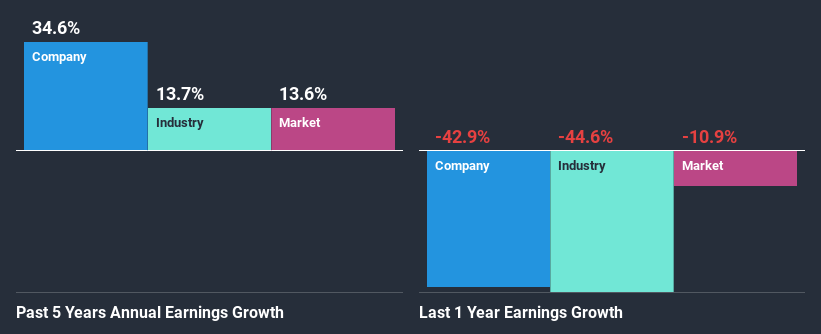- India
- /
- Hospitality
- /
- NSEI:DELTACORP
Are Strong Financial Prospects The Force That Is Driving The Momentum In Delta Corp Limited's NSE:DELTACORP) Stock?
Delta (NSE:DELTACORP) has had a great run on the share market with its stock up by a significant 18% over the last three months. Given the company's impressive performance, we decided to study its financial indicators more closely as a company's financial health over the long-term usually dictates market outcomes. Specifically, we decided to study Delta's ROE in this article.
Return on Equity or ROE is a test of how effectively a company is growing its value and managing investors’ money. In simpler terms, it measures the profitability of a company in relation to shareholder's equity.
See our latest analysis for Delta
How Is ROE Calculated?
Return on equity can be calculated by using the formula:
Return on Equity = Net Profit (from continuing operations) ÷ Shareholders' Equity
So, based on the above formula, the ROE for Delta is:
5.8% = ₹1.1b ÷ ₹20b (Based on the trailing twelve months to June 2020).
The 'return' is the profit over the last twelve months. That means that for every ₹1 worth of shareholders' equity, the company generated ₹0.06 in profit.
Why Is ROE Important For Earnings Growth?
Thus far, we have learned that ROE measures how efficiently a company is generating its profits. Depending on how much of these profits the company reinvests or "retains", and how effectively it does so, we are then able to assess a company’s earnings growth potential. Generally speaking, other things being equal, firms with a high return on equity and profit retention, have a higher growth rate than firms that don’t share these attributes.
Delta's Earnings Growth And 5.8% ROE
It is hard to argue that Delta's ROE is much good in and of itself. Still, the company's ROE is higher than the average industry ROE of 4.6% so that's certainly interesting. Even more so, after seeing Delta's exceptional 35% net income growth over the past five years. Bear in mind, the company does have a low ROE. It is just that the industry ROE is lower. Hence, there might be some other aspects that are causing earnings to grow. For example, it is possible that the company's management has made some good strategic decisions, or that the company has a low payout ratio.
Next, on comparing with the industry net income growth, we found that Delta's growth is quite high when compared to the industry average growth of 14% in the same period, which is great to see.

Earnings growth is a huge factor in stock valuation. What investors need to determine next is if the expected earnings growth, or the lack of it, is already built into the share price. This then helps them determine if the stock is placed for a bright or bleak future. What is DELTACORP worth today? The intrinsic value infographic in our free research report helps visualize whether DELTACORP is currently mispriced by the market.
Is Delta Using Its Retained Earnings Effectively?
Delta has a really low three-year median payout ratio of 18%, meaning that it has the remaining 82% left over to reinvest into its business. So it seems like the management is reinvesting profits heavily to grow its business and this reflects in its earnings growth number.
Additionally, Delta has paid dividends over a period of at least ten years which means that the company is pretty serious about sharing its profits with shareholders. Based on the latest analysts' estimates, we found that the company's future payout ratio over the next three years is expected to hold steady at 20%. Regardless, the future ROE for Delta is predicted to rise to 9.9% despite there being not much change expected in its payout ratio.
Conclusion
In total, we are pretty happy with Delta's performance. Particularly, we like that the company is reinvesting heavily into its business at a moderate rate of return. Unsurprisingly, this has led to an impressive earnings growth. If the company continues to grow its earnings the way it has, that could have a positive impact on its share price given how earnings per share influence long-term share prices. Not to forget, share price outcomes are also dependent on the potential risks a company may face. So it is important for investors to be aware of the risks involved in the business. Our risks dashboard will have the 1 risk we have identified for Delta.
When trading Delta or any other investment, use the platform considered by many to be the Professional's Gateway to the Worlds Market, Interactive Brokers. You get the lowest-cost* trading on stocks, options, futures, forex, bonds and funds worldwide from a single integrated account. Promoted
New: Manage All Your Stock Portfolios in One Place
We've created the ultimate portfolio companion for stock investors, and it's free.
• Connect an unlimited number of Portfolios and see your total in one currency
• Be alerted to new Warning Signs or Risks via email or mobile
• Track the Fair Value of your stocks
This article by Simply Wall St is general in nature. It does not constitute a recommendation to buy or sell any stock, and does not take account of your objectives, or your financial situation. We aim to bring you long-term focused analysis driven by fundamental data. Note that our analysis may not factor in the latest price-sensitive company announcements or qualitative material. Simply Wall St has no position in any stocks mentioned.
*Interactive Brokers Rated Lowest Cost Broker by StockBrokers.com Annual Online Review 2020
Have feedback on this article? Concerned about the content? Get in touch with us directly. Alternatively, email editorial-team@simplywallst.com.
About NSEI:DELTACORP
Delta
Operates in the gaming and entertainment, and hospitality businesses in India and internationally.
Flawless balance sheet with proven track record and pays a dividend.
Similar Companies
Market Insights
Community Narratives



